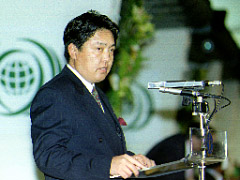


MONGOLIA - MONGOLIE | ||
His Excellency Mendsaikhan Enkhsaikhan, Prime Minister of Mongolia | ||

First of all, may I extend our sincere gratitude to the Italian people and government for their hospitality and to the FAO Director-General and his staff for the excellent organization of this important Summit. The world has undergone many changes from the time of the World Conference on Food in 1974. However, these years have not brought progress in human efforts to reduce hunger and malnutrition. Many reasons can be cited. The most sound one is the weakness of global coordination and commitment to use the abandoned resources effectively and efficiently. That is why this Summit is called upon to fill-in this missing link. That is why Mongolia has fully supported the Rome Declaration on World Food Security and the World Food Summit Plan of Action. We believe that the seven Commitments to ensure that all people, at all times, have physical and economic access to sufficient, safe and nutritious food will be fulfilled if we approach the issue as a truly global one, conditioned by achieving the goal for sustainable economic and social development. It would not be possible if we do not take into account the impact of environmental changes and natural disasters. Achieving sustainable food production is also essential for food security. The Special Programme for Food Security in Low-Income Food-Deficit Countries, therefore, should be extended to more developing countries as soon as possible to help them create their own capacity to increase food supplies. More support and assistance are necessary as well as to improve the export potential of less developed and transition countries for livestock and farm products. We commend, in this connection, the initiative of FAO to support, in each developing country, the preparation of a draft strategy for national agricultural development, Horizon 2010, as the basis for bilateral and multilateral assistance. It is specifically important for low-income food-deficit countries like Mongolia. We are happy that FAO is reviving and revamping, and committed to taking up the challenge of world food security as shown by the shift of its focus to broader, multi-dimensional political, economic and social action for eradicating poverty. I would like to share the view that modern communications have turned us into a planetary village and that the global access to vital agricultural information should be improved. I wish to add that an Internet bank of information on food surplus and deficit across countries and regions would help bridge the flow of unused resources to shortage areas in a timely and efficient manner. A timely mobilization of available resources is possible if we could cause the awareness of more people, NGOs and private institutions through better, faster and open information on situations in hunger and disaster areas, on the need for advanced technology and knowledge for higher productivity in the agricultural sector, and on demand and supply of foodstuffs. My Government is fully committed to the objectives and actions of the Plan of Action and to the principles of the Rome Declaration. Our Constitution has declared the right of citizens to have, among others, full access to qualitative, secure, and clean food. We have adopted a Law on Food, a National Programme on Food. However, it faces difficulties caused by past mismanagement and current natural disasters like the recent forest fires and the continued drought and desertification. The relatively successful transition to a market economy is coupled with social degradation like increased poverty and malnutrition. Mongolia has now become a food-deficit country. Out-dated technology, degraded soil, a severe climate and a shortage of financial resources make the agricultural sector most vulnerable. Crop farming has suffered the most. In the face of food shortages, we have been receiving food aid from multilateral agencies like FAO and bilateral donors such as Italy. The people and Government of Mongolia are grateful for that. The goal of my Government now is to build a solid technological and financial foundation for the revival of food production. We also strive to improve the quality of processing, storage and distribution of food products. However, we will need more know-how and assistance, in particular, for productive crop farming in arid and semi-arid areas, combatting drought and desertification, and developing small private farms. The problems and potential of Mongolia become interlinked with those in other countries as it integrates into the world market. Reducing food shortages and alleviating poverty in Mongolia depend on how the international community solves similar problems elsewhere, how the world mobilizes resources, and how the developed and developing countries alike are committed to fight hunger - not only as an economic, social or political issue, but also as an ethical and moral one. This first World Food Summit proves that now we are more aware of our commonality and interdependence, aware of the urgent need to unite for the future of the Earth. This has been again demonstrated by the reaction of the international community to the recent humanitarian crisis in the Great Lakes Region of Africa to which Mongolia joins its voice of support. We should not waste any one of the 1 240 days left for us before we enter the third millennium in our fight for the implementation of the spirit of the Summit if we want to have a positive recollection of the twentieth century in our history. I hope this Summit reawakens human values and the sense of responsibility before the next generation. | ||
|
|
|
|

 |